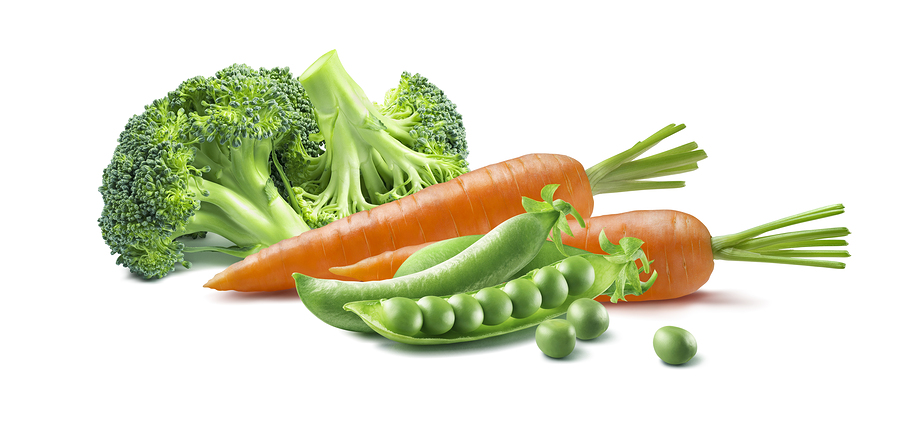
This post may contain affiliate links. We are compensated for referring customers to our affiliate partners.
Is it necessary for dog foods to contain fruits and vegetables? This is a loaded question that requires further inquiry into the health benefits and concerns of these ingredients. You will always want to consult with your veterinarian and do your research when it comes to feeding your dog commercial or homemade food and treats.
Benefits
Many dog foods contain vegetables and/or fruits somewhere down the list of ingredients behind the protein source(s). They can be beneficial for several reasons.
- They are generally a lower calorie source of fiber and vitamins. This can be especially helpful for dogs needing to lose weight.
- The fiber also helps with digestion and can alleviate constipation.
- They contain cancer-fighting and anti-inflammatory antioxidants.
- In canned foods, the water they hold promotes hydration and better absorption of nutrients.
Concerns
But be cognizant that if you change your change your dog’s food or treats from ones heavy in meats to fiber-filled vegetable ones, it can be harsh on their digestive system and potentially cause diarrhea. As with trying any new food or treats, it is helpful to slowly integrate the new stuff with the old.
If you offer vegetables and fruits to your dog outside of packaged foods and treats specific for dogs, make sure you know which ones to avoid Never let your dog have grapes or raisins. These are known to cause illness and kidney damage. You should also avoid avocado, raw potatoes, and unripe tomatoes, as these foods can potentially make your dog very sick. Chives, garlic, and onion should also not be used in homemade dog foods or treats, as they can cause anemia. Talk to your veterinarian and do your research before making your own edible pet products at home.
Beneficial Fruits and Vegetables
Pumpkin
Pet food stores will often sell canned pumpkin. This can be helpful in clearing up mild diarrhea in your dog. It absorbs excessive water in the stool and adds fiber. Mixing a little in with their dry food can get them back to regular in just a few days.
Carrots
Carrots are excellent for promoting good vision and eye health. They are rich in beta-carotene, which is an antioxidant that can help prevent cancer. Carrots are loaded with vitamins C, D, E, K, calcium, magnesium, iron, potassium, niacin, and other essential nutrients vital to supporting digestion and the immune system.
Spinach
Spinach is an exceptional source of iron and a good source of calcium, potassium, fiber, and vitamins A, B6 and K. Carotenoids and flavonoids found in spinach reduce the risk of inflammation and cancer.
Broccoli
Broccoli is a very nutritious vegetable rich in vitamins A, C, D, beta-carotene, folic acid, fiber, chromium, and calcium. Cooking broccoli releases indole, a cancer-preventing enzyme. It also contains phytochemicals that prevent carcinogens from forming and attacking cells in the body. Broccoli is a low glycemic food, so it will not raise blood glucose levels and contribute to weight gain. While broccoli has many benefits, it can lower thyroid function when ingested in large quantities, so use in limited moderation.
Celery
This vitamin-rich vegetable is a good source of iron, calcium, potassium, phosphorous, and sodium. It is high in vitamins A, B and C. It also contains a phytochemical known to help fight tumors, and it can decrease anxiety in animals and neutralize an acidic tummy. Celery can also help lower cholesterol.
Green Beans
Green beans have cardiovascular benefits, as they contain omega-3 fatty acids and have been proven to lower blood fat levels and protect against oxygen damage. They are also an excellent source of beta-carotene, vitamins A, C, and K, and thiamin, iron, potassium, calcium, copper, fiber, folic acid, niacin, manganese, and riboflavin. The nutrients found in green beans also help dogs maintain strong, healthy bones.
Apples
Apples are sometimes found in dog treats, as they are a great source of vitamin C. The skin of an apple contains pectin, which strengthens intestinal muscles and promotes healthy digestion. It also rids the intestinal tract of toxins and staves off harmful bacterial growth.
Pears
As with apples, pears also contain the beneficial ingredient pectin. Pears contain pectin to help strengthen intestines. They can also help with constipation and maintain a healthy colon. The potassium found in pears promotes heart and muscle strength and metabolizes carbohydrates. They are also good for lowering cholesterol. The vitamin C in pears helps the immune system by killing harmful bacteria and viruses and preventing infection.
Blueberries
This is another ingredient that can be found in dog foods and treats, and it is a powerful antioxidant with a wealth of benefits. Studies have shown that dog foods rich in antioxidants reduces the effects of brain aging. Blueberries are also high in vitamin C and fiber. And they contain phytochemicals, which may help prevent cancer.
There is a lot to consider when choosing commercial dog foods and treats for your pet, as well as if you decide to make your own. Consult with a veterinarian and do an exhaustive search of any ingredients you want to put in your dog’s food. Fruits and vegetables can have wonderful benefits, but some can cause harmful damage or make your dog very ill. This list of fruits and vegetables is far from complete, and different foods have different effects on dogs than they do to humans, so be cautious with the variety and amounts of the ingredients you feed your dog.
